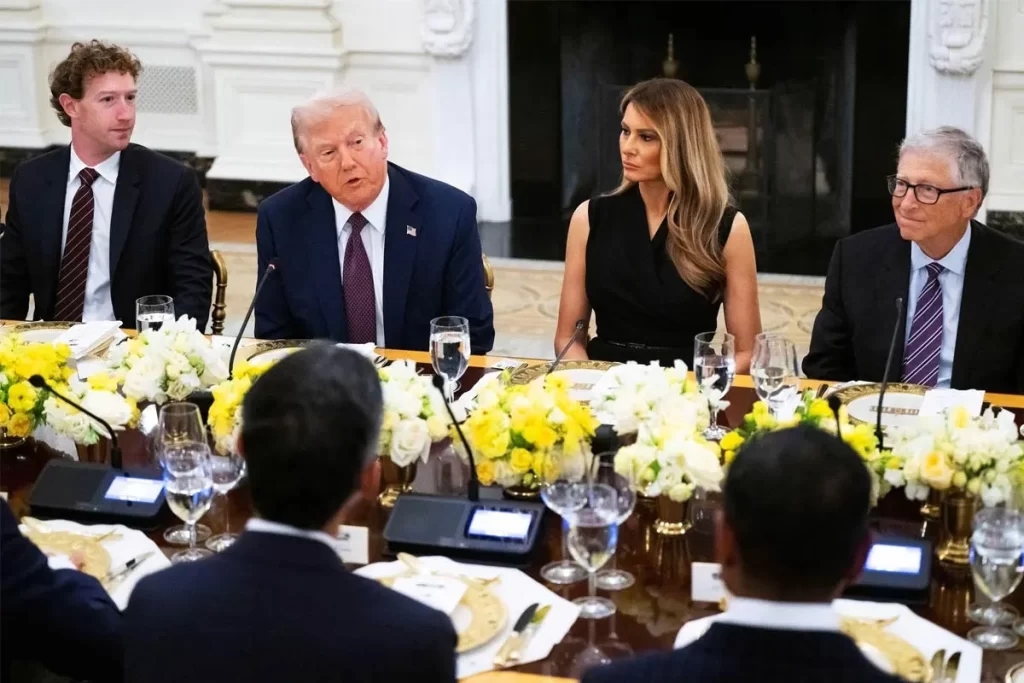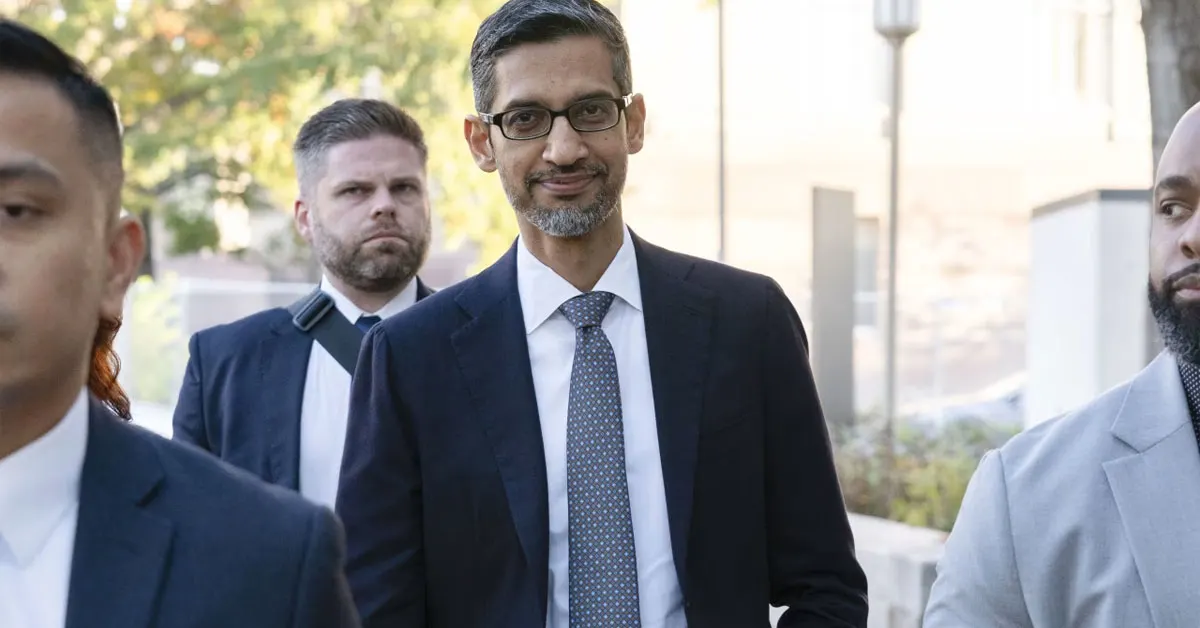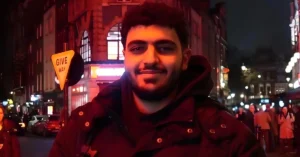- Google’s Chrome narrowly escaped a forced breakup, reshaping the stakes of its landmark antitrust trial.
- Judge’s ruling forces Google to share select search data but stops short of dismantling its empire.
- Google’s exclusive deals with Apple, Samsung, and Android funneled billions of users, now partly curtailed by the ruling
- A $425M privacy verdict adds fresh pressure on the tech giant already battling regulators worldwide.
- Sundar Pichai thanked President Trump for the administration’s role in the antitrust ruling.
- The case signals how antitrust, privacy, and AI disruption are colliding in Big Tech’s next chapter.
After a five-year legal battle, U.S. District Judge Amit Mehta issued a remedies opinion that upends some of the Department of Justice’s (DOJ) most aggressive requests while putting targeted limits on how Google keeps competitors off users’ devices. The judge stopped short of ordering a breakup — Google will keep Chrome and Android, but imposed a mix of behavioral and data-access remedies designed to dilute advantages the government said were created by Google’s exclusive distribution deals.
Mehta’s 230-page opinion walks a tightrope: it affirms the court’s earlier finding that Google illegally monopolized general online search, but it also frames remedies through the lens of a rapidly changing marketplace — especially the explosive rise of generative AI tools that the judge says already pose a competitive threat to traditional search.
The key orders: What Google must and must not do
- No forced divestiture of Chrome or Android: Mehta concluded a structural breakup would be “incredibly messy and highly risky” and that Google’s market dominance could not be attributed sufficiently to illegal conduct to justify divestiture.
- End exclusive default search deals: Google is barred from entering or maintaining exclusive agreements that make Google the automatic default search on devices or browsers — but it may continue non-exclusive payments to partners to preload its products.
- Data sharing with limits: Google must provide qualified competitors a one-time snapshot of its search index and disclose certain user-interaction datasets under privacy safeguards; advertising data is excluded. The court tailored the scope to reduce “free-riding” and to protect user privacy.
- Syndication & pricing: Competitors may buy search results and text-ad syndication on terms the court allowed (narrower than DOJ sought), with pricing and duration constraints.
- Technical oversight committee (TC): A specialized oversight body will monitor compliance for a limited period (six years), narrower than DOJ’s initial proposal.
Why Mehta declined to order a breakup?
Judge Mehta wrote that the court must distinguish anticompetitive acts from success born of “a superior product, business acumen, or historic accident.” After the liability phase, and after seeing the remedies record, the judge concluded divestiture was not the right fit. He repeatedly flagged the rise of generative AI — from ChatGPT to Perplexity and other entrants — as a market development that significantly changed the competitive landscape since the case began. That evolution, he wrote, counseled caution about radical structural remedies.
Mehta also emphasized practical risk: unwinding tightly integrated systems such as Chrome and Android could harm consumers and partners and create messy technical fallout — a point Google argued forcefully.
What the data-sharing remedy actually is, and its limits?
The heart of the DOJ’s behavioral pitch was not simply distribution but the data advantage Google enjoys. Mehta ordered Google to provide certain search index data and user-interaction datasets to “Qualified Competitors,” but stopped short of turning over the full trove the DOJ wanted (notably, no ad data, and other datasets remain out of scope). In practice, the ruling gives rivals a one-time crawl/index snapshot and subject to safeguards, some ongoing user-interaction disclosures subject to anonymization rules and oversight by the TC. Critics argue those limitations blunt the competitive utility.
Mehta and other commentators stressed the balancing act: sharing too much, too often, risks privacy and free-riding problems; sharing too little risks leaving incumbency intact. The judge tried to thread that needle.
Why AI changed the remedy calculus?
Mehta repeatedly cited the emergence of generative AI as a market shock. He noted that AI entrants are already attracting billions of dollars and that they may compete with Google for how users find information, a dynamic that reduces the need for the court to “force” structural change today. The judge wrote that the court is asked to “gaze into a crystal ball” about the future; acknowledging the limits of judicial foresight, he opted for narrower remedies tailored to the illegal conduct proven at trial.
DOJ lawyers and many antitrust scholars countered during remedies hearings that allowing Google to maintain entrenched defaults while only offering limited data relief risks letting the company entrench leverage in future AI markets. DOJ attorney David Dahlquist argued remedies should be broad enough to prevent Google from leveraging its search advantage into AI dominance.
Reactions: Government, Google, Rivals, and Investors
Google hailed the decision to avoid a sale of Chrome as vindication. In a company blog post, Lee-Anne Mulholland, Google’s VP for regulatory affairs, wrote that forcing a sale “would have gone beyond the case’s focus on search distribution, and would have harmed consumers and our partners.” Google said it is reviewing the order and raised concerns about privacy implications of data sharing.
The DOJ framed the decision as restoring competition while reserving its options. Assistant Attorney General Abigail Slater (Gail) said the Department will “continue to review the opinion to consider the Department’s options and next steps regarding seeking additional relief.”
Rivals and advocates were sharply divided. Gabriel Weinberg, CEO of DuckDuckGo, warned the remedies “don’t go far enough” and called for Congressional action to force a level playing field. Christian Kroll, founder of Ecosia, and AI startup Perplexity publicly signaled interest in Chrome acquisition. Perplexity offered an unsolicited $34.5 billion term sheet.
Markets cheered the ruling. Alphabet shares jumped sharply as investors priced in the absence of a disruptive break-up and the chance to preserve lucrative default arrangements with device makers. Analysts estimated the Apple-Google default payments (previously reported at around $20 billion a year) remain a major revenue lock for Google and its partners.
Google’s trial draws inspiration from Microsoft’s antitrust battle?
This is the biggest antitrust decision involving a U.S. tech giant since U.S. v. Microsoft, that older case, which challenged Microsoft’s bundling of Internet Explorer with Windows, produced sweeping remedies that were partly reversed on appeal and ultimately resolved by consent remedies rather than a full structural breakup. DOJ filings and experts referenced the Microsoft roadmap repeatedly during the remedies phase; Mehta’s opinion echoes the cautionary history while applying it to a platform of far greater technical complexity.
How Google Locks In Its Search Monopoly
Google’s dominance in search is rooted less in the superiority of a single product and more in its distribution power. By securing lucrative default-placement deals, the company ensured that billions of users were funneled into its ecosystem almost by design.
The Department of Justice argued that exclusive agreements with device makers like Apple and Samsung gave Google a privileged channel. Apple alone has received an estimated $20 billion annually from Google to keep its search engine as the default option, a figure that highlights how much Google is willing to pay to keep competitors at bay.
Beyond these contracts, Google leverages its own products, particularly Chrome and Android, to reinforce its grip. Defaults on Chrome channel nearly 40% of U.S. search queries, while Android’s preloaded apps and system-level settings steer users toward Google services. This creates a self-reinforcing cycle: more searches generate more data, which strengthens Google’s search algorithms and advertising reach, making it even harder for rivals to break in.
Judge Mehta’s ruling chips away at this structure by banning exclusive default contracts, forcing Google to loosen its hold. Yet he allowed the company to continue non-exclusive preload payments, a compromise that may soften distribution lock-in without dismantling the financial incentives that keep device makers tethered to Google.
Other legal pressure on Google: privacy verdict and ad-tech trial
The search remedies ruling arrives amid a wave of parallel litigation. Days after Mehta’s remedies order, a San Francisco jury returned a $425 million verdict in a consumer privacy class action alleging Google collected data after users believed they’d turned off settings meant to keep it private; Google said it will appeal. Separately, Google faces another high-stakes DOJ trial over its ad-tech stack scheduled to address separate monopolization claims. Together, these cases mean Google is defending multiple fronts in court and in public opinion.
What this will (and will not) do for rivals and AI developers
The ruling will give some rivals a technical boost, a one-time index snapshot and certain user-interaction datasets could help smaller search players and AI developers accelerate indexing and model training. But many experts warn the remedy is narrow: the snapshot will age, ad data remains shielded, and Google retains many levers (non-exclusive preloads, pricing power in ad auctions) that sustain monetization and product refinement. Neil Chilson of Abundance Institute noted, “it’s unclear how helpful these AI-specific remedies will be for the competitors,” – “I think that for the biggest of the companies that Google is competing with in the AI space, these remedies won’t be a big value add,” Chilson added.
Practically, any material competitive shift will take time, rivals must ingest the shared data, iterate product relevance, and persuade users to switch. Investors and many corporate partners concluded the ruling reduces the near-term chance of a disruptive structural remedy, that’s reflected in the market reaction.
Pichai Acknowledges Trump’s Role in Antitrust Case

US President Donald Trump and First Lady Melania Trump host tech leaders, including Mark Zuckerberg and Bill Gates for a dinner in the State Dining Room of the White House
Following the favorable ruling in Google’s antitrust case, CEO Sundar Pichai publicly thanked President Donald Trump for the administration’s “constructive dialogue” throughout the legal proceedings. During a White House dinner on Thursday, September 4th, including Mark Zuckerberg, Tim Cook, Bill Gates, Sam Altman, Satya Nadella, and Sergey Brinn among others, President Trump remarked, “You had a very good day yesterday,” referring to Google’s stock surge post-ruling. Pichai expressed relief, stating, “I’m glad it’s over,” and appreciated the administration’s engagement in resolving the matter. He also expressed eagerness to collaborate on artificial intelligence initiatives, highlighting the importance of continued dialogue between the tech industry and government.
What to watch next?
- DOJ’s decision whether to appeal Mehta’s remedies opinion (the Department already signaled it will “review the opinion”).
- The Technical Committee’s formation and the precise rules governing anonymization, data formatting and what counts as a “Qualified Competitor“. Those procedural rules will determine how useful the shared data is in practice.
- How quickly AI rivals (OpenAI, Perplexity, Meta, Anthropic, others) act on newly accessible data — and whether they can convert it into credible search or AI experiences that meaningfully shift user behavior.
- Parallel litigation outcomes (ad-tech trial, appeals, privacy verdicts) that together shape Google’s legal and strategic calculus.
Judge Mehta’s remedies opinion is neither the DOJ’s scorched-earth remedy nor Google’s full victory: it is a carefully calibrated, technically informed decision that attempts to balance consumer harm, privacy, and the dynamic reality of an AI-reshaped market. Whether that balance actually opens durable competitive pathways or simply nudges a still-dominant Google will turn on rule writing, implementation, and the speed at which rivals convert new access into superior user experiences.
Editor’s note
This article is based on the court’s remedies opinion, DOJ and Google statements, and contemporaneous reporting from Reuters, The Verge, The Washington Post and public filings. I preserved all official quotes verbatim; where Mehta’s ruling delegated technical details to implementing orders (e.g., what qualifies as anonymized user interaction data and how the Technical Committee will operate), those specifics will be decided in follow-on proceedings and may change the practical effect of today’s orders.






